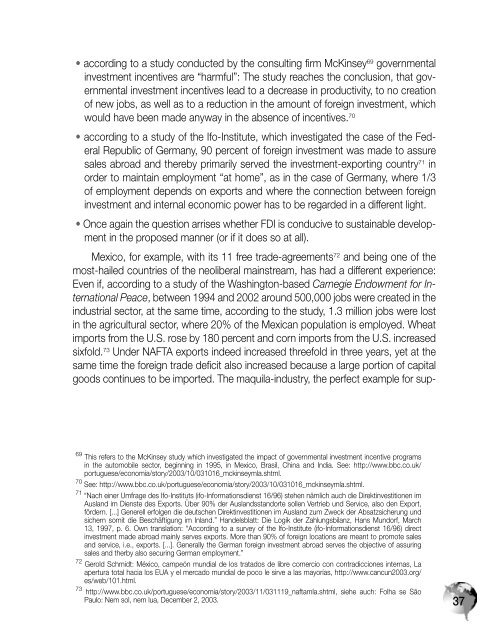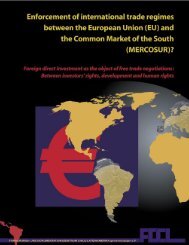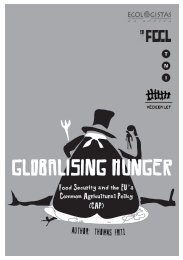Download - FDCL
Download - FDCL
Download - FDCL
Create successful ePaper yourself
Turn your PDF publications into a flip-book with our unique Google optimized e-Paper software.
• according to a study conducted by the consulting firm McKinsey 69 governmental<br />
investment incentives are “harmful”: The study reaches the conclusion, that governmental<br />
investment incentives lead to a decrease in productivity, to no creation<br />
of new jobs, as well as to a reduction in the amount of foreign investment, which<br />
would have been made anyway in the absence of incentives. 70<br />
• according to a study of the Ifo-Institute, which investigated the case of the Federal<br />
Republic of Germany, 90 percent of foreign investment was made to assure<br />
sales abroad and thereby primarily served the investment-exporting country 71 in<br />
order to maintain employment “at home”, as in the case of Germany, where 1/3<br />
of employment depends on exports and where the connection between foreign<br />
investment and internal economic power has to be regarded in a different light.<br />
• Once again the question arrises whether FDI is conducive to sustainable development<br />
in the proposed manner (or if it does so at all).<br />
Mexico, for example, with its 11 free trade-agreements 72 and being one of the<br />
most-hailed countries of the neoliberal mainstream, has had a different experience:<br />
Even if, according to a study of the Washington-based Carnegie Endowment for International<br />
Peace, between 1994 and 2002 around 500,000 jobs were created in the<br />
industrial sector, at the same time, according to the study, 1.3 million jobs were lost<br />
in the agricultural sector, where 20% of the Mexican population is employed. Wheat<br />
imports from the U.S. rose by 180 percent and corn imports from the U.S. increased<br />
sixfold. 73 Under NAFTA exports indeed increased threefold in three years, yet at the<br />
same time the foreign trade deficit also increased because a large portion of capital<br />
goods continues to be imported. The maquila-industry, the perfect example for sup-<br />
69 This refers to the McKinsey study which investigated the impact of governmental investment incentive programs<br />
in the automobile sector, beginning in 1995, in Mexico, Brasil, China and India. See: http://www.bbc.co.uk/<br />
portuguese/economia/story/2003/10/031016_mckinseymla.shtml.<br />
70 See: http://www.bbc.co.uk/portuguese/economia/story/2003/10/031016_mckinseymla.shtml.<br />
71 “Nach einer Umfrage des Ifo-Instituts (ifo-Informationsdienst 16/96) stehen nämlich auch die Direktinvestitionen im<br />
Ausland im Dienste des Exports. Über 90% der Auslandsstandorte sollen Vertrieb und Service, also den Export,<br />
fördern. [...] Generell erfolgen die deutschen Direktinvestitionen im Ausland zum Zweck der Absatzsicherung und<br />
sichern somit die Beschäftigung im Inland.” Handelsblatt: Die Logik der Zahlungsbilanz, Hans Mundorf, March<br />
13, 1997, p. 6. Own translation: “According to a survey of the Ifo-Institute (ifo-Informationsdienst 16/96) direct<br />
investment made abroad mainly serves exports. More than 90% of foreign locations are meant to promote sales<br />
and service, i.e., exports. [...]. Generally the German foreign investment abroad serves the objective of assuring<br />
sales and therby also securing German employment.”<br />
72 Gerold Schmidt: México, campeón mundial de los tratados de libre comercio con contradicciones internas, La<br />
apertura total hacia los EUA y el mercado mundial de poco le sirve a las mayorías, http://www.cancun2003.org/<br />
es/web/101.html.<br />
73 http://www.bbc.co.uk/portuguese/economia/story/2003/11/031119_naftamla.shtml, siehe auch: Folha se São<br />
Paulo: Nem sol, nem lua, December 2, 2003.<br />
37









